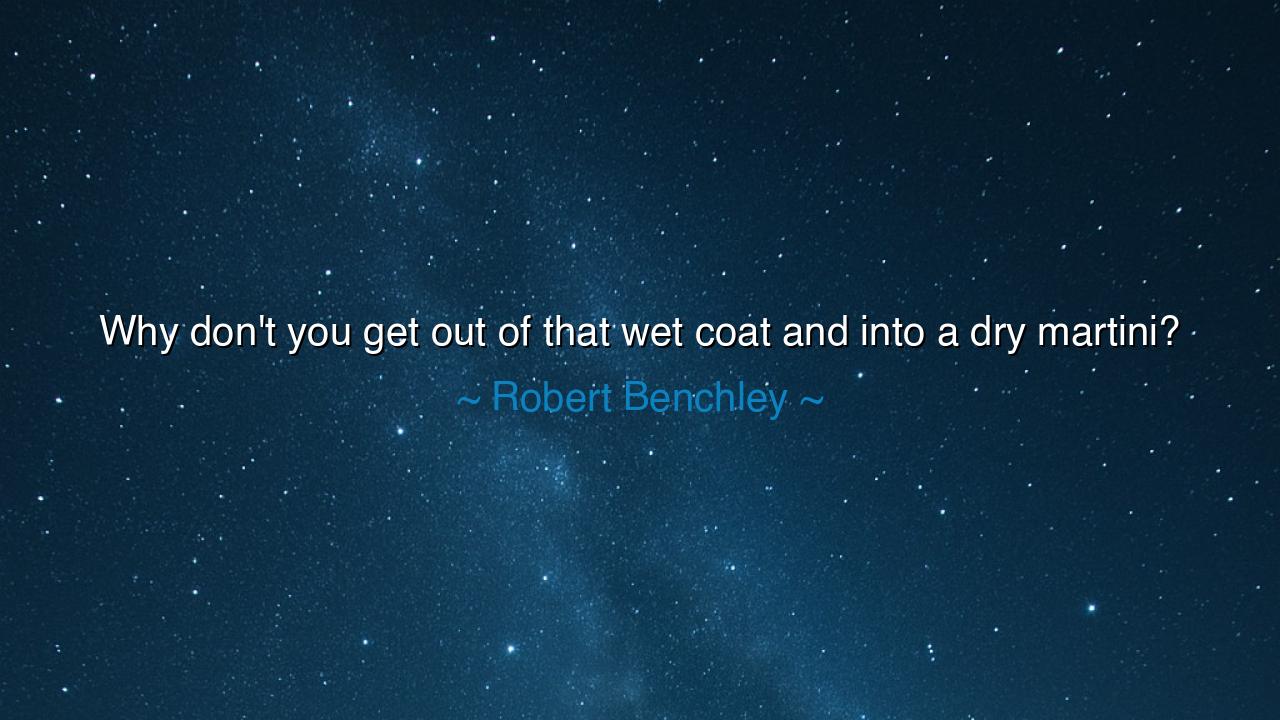
Why don't you get out of that wet coat and into a dry martini?






“Why don’t you get out of that wet coat and into a dry martini?” — Robert Benchley
In this sparkling line, Robert Benchley, the great humorist of the early twentieth century, performs a dance between wit and wisdom, levity and life. To the untrained ear, it is merely a clever quip — a play on words meant to amuse. But to those who listen with the heart as well as the ear, it reveals something deeper about grace, charm, and the art of living lightly amid life’s storms. The line, smooth as the martini it invokes, is not only an example of Benchley’s brilliant humor, but also a parable of composure: when the world soaks you in its troubles, do not merely dry your clothes — restore your spirit.
The origin of this quote comes from the age of the Algonquin Round Table, that legendary gathering of writers, critics, and thinkers in 1920s New York who sparred with wit as knights once did with swords. Among them were Dorothy Parker, Alexander Woollcott, George S. Kaufman, and of course, Robert Benchley — men and women who transformed conversation into art. It was in that world of laughter and intellect that Benchley’s line was born. He was famed for his ability to turn the smallest moment — a dripping coat, a drink, a word — into something immortal. His humor, though sophisticated, was never cruel; it revealed not arrogance, but humanity, the ability to find comfort and laughter even in discomfort.
In its literal sense, the quote captures a scene of warmth and hospitality: a friend arriving from the rain, greeted not with judgment or fuss, but with charm and lightness. “Get out of that wet coat and into a dry martini” — it is the voice of the gracious host who knows that the world can be wearying, and that the simplest gift — a laugh, a drink, a moment of reprieve — can lift a heavy heart. This is the spirit of humor as compassion. The wise do not add to another’s burden with complaint or pity; they lift it gently with laughter.
Yet, beneath its playfulness, the line also carries a metaphor for life itself. We all, at one time or another, find ourselves drenched by the storms of circumstance — disappointment, stress, or sorrow. The “wet coat” becomes the symbol of that weight we carry: the soaked garments of worry and self-seriousness. Benchley’s humor suggests the remedy — not denial, but transformation. Do not sit shivering in your troubles; instead, change your state of being. Step out of heaviness and into renewal, into the “dry martini” of laughter, joy, and connection. For humor, rightly understood, is a spiritual warmth — the hearth where the coldness of the world melts away.
The ancients knew the wisdom of this transformation. Diogenes, the philosopher who lived in simplicity and scorned vanity, used humor as a weapon against despair. When asked why he laughed in hardship, he replied that laughter was freedom from the tyranny of misfortune. In the same way, Benchley’s jest conceals this truth: that lightness is not frivolity, but mastery — the art of keeping one’s dignity and joy even when life soaks you to the bone. To invite someone to “get into a dry martini” is, in its essence, to invite them to reclaim their warmth, their wit, their spirit — to remind them that storms pass, but humor endures.
We might see this spirit in the life of Benchley himself. Behind his polished humor was a man who wrestled with insecurity and melancholy, who found in laughter not escape, but balance. He wrote in an age shadowed by war and depression, when irony became both shield and sword. Yet, rather than succumb to cynicism, he chose gentleness — humor that healed rather than mocked. Like a gracious host welcoming the weary traveler, he offered the world a moment’s rest from its anxieties, a place by the fire where laughter replaced lament. His humor, much like his quote, was both invitation and blessing.
So, my child, take this teaching to heart: when life drenches you in rain, do not simply wait for the storm to end. Shed your wet coat — the burdens you cannot carry — and step into joy, even if only for a moment. Seek comfort not in bitterness, but in the small acts of lightheartedness that remind you of your humanity. Offer the same grace to others: when you see someone weary from the rain of the world, do not offer pity, but warmth — perhaps even a joke, a gesture, a dry martini of the spirit.
For this is the lesson of Robert Benchley: that humor, when born from kindness, is a sacred act. It is the art of turning discomfort into delight, sorrow into laughter, strangers into friends. To “get out of the wet coat” is to free yourself from the heaviness of life; to “get into the dry martini” is to sip from the cup of courage and joy. And those who learn to live this way — with lightness, hospitality, and humor — will find that even in the fiercest storm, their hearts remain dry and warm.






AAdministratorAdministrator
Welcome, honored guests. Please leave a comment, we will respond soon